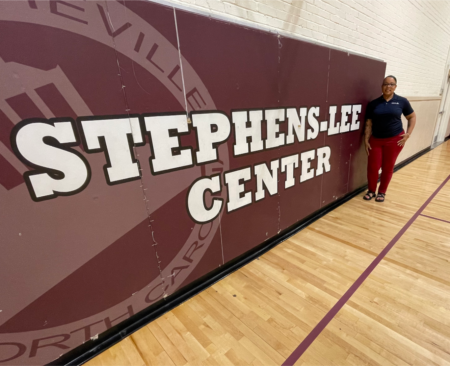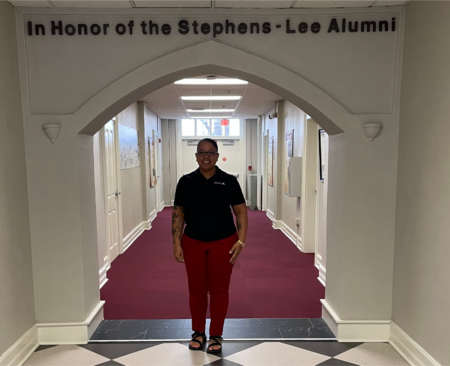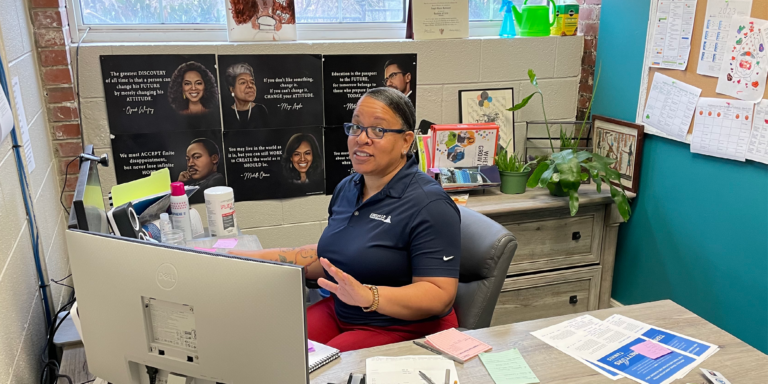“As a lifelong Ashevillian, I have watched the struggles of the youth increase. I have worked with children for 25 years and it’s becoming a personal experience witnessing our children go through the juvenile justice system. I want to place myself where I can be proactive. This is my reason for joining the Juvenile Crime Prevention Council.”
 As the Facility Supervisor at Stephens-Lee Community Center, Angel Redmond is the face of Asheville Parks & Recreation (APR) to hundreds of community members who visit the center each week, as well as those who live in the surrounding East End/Valley Street neighborhood and Stephens-Lee High School alumni. She’s also a member of Buncombe County’s Juvenile Crime Prevention Council (JCPC), a group of social workers, educators, youth representatives, nonprofit leaders, law enforcement officers, attorneys, judges, residents, and local public servants who work to prevent young people who are at risk from becoming involved in the criminal justice system, providing alternatives that protect our youth and community. The primary intent of the council is to develop community-based alternatives to youth development centers by effectively intervening, educating, and treating young people in order to strengthen families and support systems, build community, and increase public safety.
As the Facility Supervisor at Stephens-Lee Community Center, Angel Redmond is the face of Asheville Parks & Recreation (APR) to hundreds of community members who visit the center each week, as well as those who live in the surrounding East End/Valley Street neighborhood and Stephens-Lee High School alumni. She’s also a member of Buncombe County’s Juvenile Crime Prevention Council (JCPC), a group of social workers, educators, youth representatives, nonprofit leaders, law enforcement officers, attorneys, judges, residents, and local public servants who work to prevent young people who are at risk from becoming involved in the criminal justice system, providing alternatives that protect our youth and community. The primary intent of the council is to develop community-based alternatives to youth development centers by effectively intervening, educating, and treating young people in order to strengthen families and support systems, build community, and increase public safety.
The North Carolina Department of Public Safety’s Division of Juvenile Justice and Delinquency Prevention allocates around $23 million to local councils each year to support programs and services. Buncombe County can recommend funding in one- or two-year increments.
A recent local summary risk and needs report identified nine priority areas of needed programs and possible gaps in the service continuum:
- Priority 1: Restitution/Community Service
- Priority 2: Comprehensive Clinical Assessments/Individual or Group Counseling
- Priority 3: Teen Court/Restorative Services
- Priority 4: Runaway/Temporary Shelter
- Priority 5: Interpersonal or Experiential Skills
- Priority 6: Vocational Skills
- Priority 7: Substance Use Services
- Priority 8: Parent and Family Skill Building
- Priority 9: Structured Day/Tutoring/Academic Enhancement/Mentoring
 “I have made connections with members of the courthouse, from lawyers and judges to court counselors, program leaders, and extended members of the community all working with one goal in mind: save our youth,” according to Angel. “All funded programs are outcome-based, compatible with research that are shown to be effective, recognize the sensitivity to Racial Ethnic Disparity that exists in Buncombe County, and have an evaluation component.”
“I have made connections with members of the courthouse, from lawyers and judges to court counselors, program leaders, and extended members of the community all working with one goal in mind: save our youth,” according to Angel. “All funded programs are outcome-based, compatible with research that are shown to be effective, recognize the sensitivity to Racial Ethnic Disparity that exists in Buncombe County, and have an evaluation component.”
For the fiscal year 2023-2025, JCPC has an anticipated allocation of $644,477. Organizations will present proposals in an allocations hearing on Wednesday, March 15. JCPC will offer funding recommendations to Buncombe County Commissioners for approval.
“Our team of parks and recreation professionals bring a tremendous skills and hands-on experience when it comes to kids, teens, and young people in our community,” according to APR Director D. Tyrell McGirt. “Even though our programs at parks and community centers offer safe spaces and caring environments, we know we are even more effective when we work with other organizations to address community-wide challenges. I’m proud Angel is going above and beyond, using her talent and expertise outside of work to bring real change to the community we love and ensure all of our youth have the tools to succeed.”
Driven by the promise that Asheville is a better and safer place when everyone from infants to retirees has the opportunity to be supported, healthy, and successful, APR offers a variety of wellness-, education-, and culture-related programs for Ashevillians of all ages. For current opportunities, check out the program guide.
